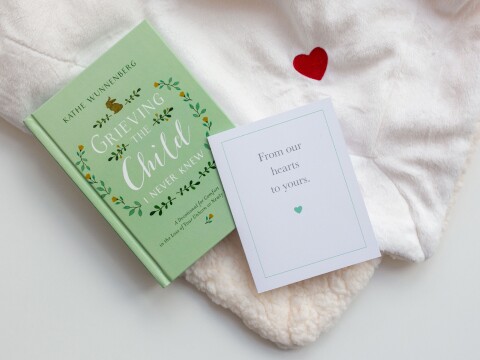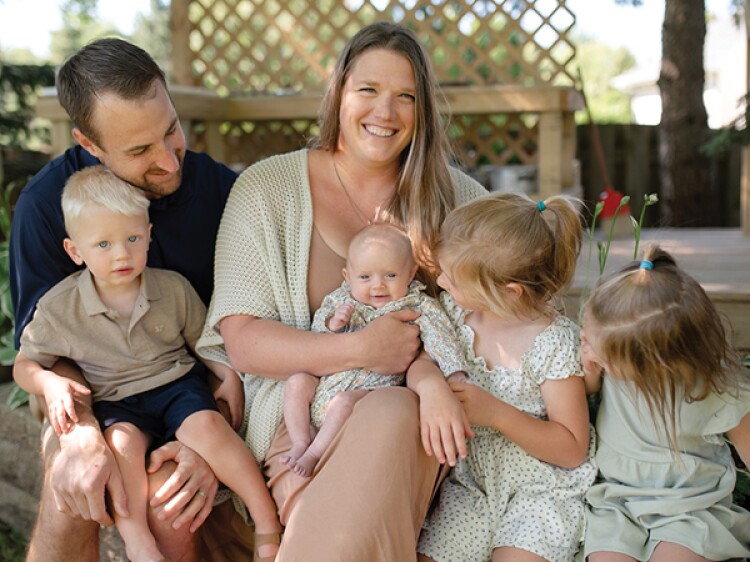In May 2022, Kristina and Andrew Skowanderson of Appleton, Wisconsin, went to their doctor’s office for a routine ultrasound. Kristina was pregnant with twins and both babies were healthy at the 32-week check. But at 33 weeks, they received the news that “Baby A” (Espen) was still healthy and growing. However, “Baby B” (Kristian) no longer had a heartbeat.
Kristina delivered Espen and Kristian several weeks later, on May 31. On top of the demands of a newborn, Kristina and Andrew faced an even greater challenge: How could they “navigate the happiness and the grief of Espen and Kristian?”
It’s not a journey they walk alone. In recent years, multiple pregnancies (of twins, triplets or more) have been
As Kristina and Andrew reflect on their loss, here are the resources and strategies they say helped them through their most difficult time.
Assistance & support for parents who have lost a baby
There may be comfort items and services available to bereaved parents. While some of these are provided by immediate friends and family members, others may be offered by local or national nonprofits or organizations.
Meal train
The Skowandersons’ church friends took turns providing lunches and dinners to relieve Kristina and Andrew of grocery shopping, food prep and cooking time. So they could spend more of their time and energy on working through the loss of Kristian and caring for Espen—and their other children—at home.
Help with tasks
The gift of your time is a powerful one. And to-dos after a loved one dies (like cleaning, laundry and lawn care) can feel heavy. Kristina’s dad, for example, stepped in to handle funeral planning.
Care package
Care packages can provide tokens of remembrance and comfort for parents experiencing infant loss. Andrew’s co-workers at Thrivent sent a
“Thrivent is an organization committed to being there for our membership and their families in the moments that matter,” says Amy Heinen, director of Member Engagement Strategies at Thrivent. “That’s why we created this care package—so members can care for their friends and loved ones by sharing this with parents experiencing miscarriage, stillbirth or the loss of a newborn.”
Jennifer Behrens, a Client Insights and Strategy manager at Thrivent, helped develop this care package. She and her team conducted research and interviews to help guide what is included in the care package. Behrens says she discovered that one of a grieving parents’ biggest needs is simply to be acknowledged.
“It’s so important to recognize the parents’ loss and their deep love and dreams for this child and for their family,” she says.



Financial relief
Monetary support can help families with final expenses, hospital bills, self-care and more. While personal checks and cash donations can be extremely thoughtful, infant loss grants also may be available. Shortly after Kristina and Andrew got their Thrivent condolence care package, they also received a grant for grieving parents, a benefit for eligible Thrivent clients with membership. Andrew’s work team supports this and other
“It felt like they were thinking about us and really [saying], ‘We're here for you and let us know how we can continue to support you,” Andrew says. “It was nice to have Thrivent show up during that time, when so many other people don't know how to help.”
Emotional support & what to say after loss
In addition to taking the right actions, saying the right words also can help the grief process. But that’s often easier said than done. Here are some conversational cues and pointers that can offer empathy and comfort.
Acknowledge the loss
The Skowandersons know talking about death is hard. “It's a really uncomfortable conversation to bring up, and most people don't know how to bring it up—so they don't,” Andrew says. But not bringing it up can make grief feel isolating, like there isn’t space to talk and cry about the loss.
They’ve noticed that some people have been hesitant to ask how they’re doing for fear that bringing it up might “remind” a loved one of their loss and cause more pain. But Andrew and Kristina say that, from their perspective, it’s always better to ask. For them, there’s nothing another person can say or do to make losing a child any more painful, since the pain of their loss always is with them.
Use thoughtful language
In the case of a twin pregnancy where there is one surviving baby, it’s important to gently ask parents how they prefer certain topics to be discussed. For example:
- Do they still want their surviving baby to be referred to as a twin?
- What is the name of the baby who died? (Look for ways to use this in conversation when appropriate.)
- Avoid comments that can minimize grief, such as “you are lucky to still have one.”
Talk to a therapist
Throughout the past two years, the Skowandersons have continued to see their perinatology therapist about once a month. “Just finding someone to talk to—I think that's my best advice,” Kristina says. “Find a professional to help.”
Kristina says that having their therapist as a resource has been “extremely helpful in understanding grief—that grief is not a linear thing. It's not a race, and it just ebbs and flows.” It has not only helped them process their grief together, as a couple, but also has helped them hold space for how each of them, individually, processes it in their own unique ways.
Andrew agrees. “You're holding this perfectly happy and healthy baby in your arms, and then you're thinking about the one you lost,” he says. “In talking with our therapist, she always said the negative or the sad thoughts will [often] overpower the happy thoughts. And it is something that we've had to deal with.”
Therapists also may be connected community members who can help clients find additional support and resources.
“[Therapy has] also helped us to talk to other people about their grief—just general grief,” Kristina says. “We were never in therapy before, and it's helped so much to be able to connect with other people who lost a family member or lost their job or all those different ways that people have anxiety and grief in their life. So that's been a really cool way that we've connected with people.”
Join a support group
“[Our therapist] organized a support group with other parents of child loss or infant loss,” Kristina says. “So we've met a couple other couples who have different stories than us, but a lot of similarities in things as well, and especially our grief journeys.”
“Even though the situations are a little bit different, the type of grief we are experiencing is very, very closely related,” Andrew adds.
“But it is hard,” Kristina says. “There's not many other resources.” That’s one of the reasons why she and another woman from their support group, with encouragement from their therapist, started “The Healing Hive,” a monthly community-based child loss group. It’s open to any community members who have experienced infant or child loss.
“We've met a lot of cool people through that,” Kristina says, noting there previously wasn’t any type of community group separate from group therapy available in their area before launching Healing Hive. And Andrew’s presence in the group—which initially was just women, other than him—has helped carve out a space where husbands and fathers also can come to process their grief.
We were never in therapy before, and it's helped so much to be able to connect with other people who lost a family member or lost their job or all those different ways that people have anxiety and grief in their life.
Continue the conversation
While Andrew and Kristina had a lot of help and support the first couple of months after losing Kristian, they noticed that support dwindled after that. They acknowledge that they had a difficult time talking about their loss and how they were doing during that time, and they were very guarded. But they wish more people had showed up in the five to six months afterward, when they were more ready to verbally process their experience with loved ones.
“Once that armor fell off, when we got out of just survival mode, that's when we really needed support from people,” Kristina says. “We needed people to ask us how we were doing.”
Their own experience has led them to be intentionally present for people experiencing loss in that timeframe. “We try to show up at month five now, because we've been there,” Kristina says.
How to remember and celebrate
Helping a child live on through their legacy can be both powerful and healing. Look to these ideas for inspiration.
Cherish keepsakes
Whether they’re items you keep for yourself or give to others experiencing loss, memorial gifts can be special treasures to keep loved ones on our hearts and minds. From framed photos and personalized stuffed animals to jewelry and garden stones, these special items can offer remembrance and comfort.
Devote a day
During that first year, the Skowandersons decided one way that they can honor Kristian’s life is by celebrating “Kristian’s Day” every May 3, the anniversary of the day they found out that they had lost him.
Dedicating a separate, special day a day for Kristian also keeps the boys’ birthday a happy celebration for Espen.
Early on, Kristina says, “Espen got a lot of our tears, which was hard. That's something that we're extremely sensitive about—is that, as sad as his story is, it's not his story, it’s Kristian's story. We have to try and distinguish the two stories. And that's been hard because Espen's story is very happy and he's just a joy of a kid. And unfortunately, his story also has some rain clouds.”
Involve everyone
The past two-plus years have certainly been a journey for the Skowandersons, who already had two daughters before becoming pregnant with Espen and Kristian. This May, almost two years to the day they found out that Kristian had died, they also welcomed another new baby, Estrid. Navigating grief is its own challenge. Adding kids to the mix makes it all the more challenging at times—but it also has brought many moments of needed joy and laughter.
In 2023, on the first anniversary, they built a mud kitchen in their backyard with some of the grant money they received. They call it “Kristian’s Kitchen.”
“Even though the kids are not able to create memories directly with Kristian, they can still make fun memories playing in his kitchen,” Andrew says.
And they certainly have. “For all three of our older kids, that's pretty much the place they gravitate toward,” Kristina adds. “It’s very well-loved.”
They plan on adding something small to the mud kitchen area each year in memory of Kristian. This year, they added flower beds to the kitchen and planted white tulips. “Every year now, there will be white tulips that come up pretty much right around Kristian’s Day,” Kristina says.







